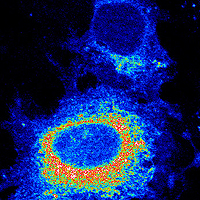USC

Cellular Stress Linked to Drug Resistance
By doing their job, certain drugs can force tumor cells
into a survival mode that can help them resist
destruction during chemotherapy. Unopposed, this
mechanism results in victory for cancer cells, says a
USC researcher who believes there is a way around such
cellular defense.

When chemotherapy is withdrawn, the surviving
cancer cells flourish, according to a USC
researcher.
This response provides a novel explanation to address the failure of these drugs to meet initial expectations in the battle against the growth and spread of malignant tumors.
In a study published in the July 1 issue of the journal Cancer Research, the USC team of researchers – in collaboration with researchers from the National Cancer Institute and MannKind Corp. of Valencia, Calif. – showed that anti-angiogenesis drugs that target the formation and upkeep of blood vessels can increase levels of a protein called glucose regulated protein 78, which can work to block cell death, or apoptosis. GRP78 is synthesized and found primarily in the cell’s endoplasmic reticulum, or ER.
“When you look at the successful cancer therapies, they often lose efficacy over time because of resistance in the tumor cells,” said Amy S. Lee, professor of biochemistry and molecular biology in the Keck School of Medicine, associate director of basic sciences at the USC/Norris Comprehensive Cancer Center and principal investigator for this research.
“The majority of patients today die not from a primary tumor, but from a failure of the body to overcome the development of resistance to the drugs that treat that tumor.”
Lee’s research sheds light onto why that resistance might develop in the first place. Her study shows that anti-angiogenesis drugs, by doing the very job they are supposed to do – starving cells of oxygen and glucose – force tumor cells into a survival mode in which they turn on genes like GRP78 that can help them to both resist and survive the onslaught.
“When a tumor is under the attack of chemotherapy drugs and trying to survive and grow, they turn on this protective mechanism,” she said. “In fact, I think it’s an innate property of a cancer cell to turn on this survival mechanism, which is used to protect normal cells during stress.”
When unopposed, this mechanism can give cancer cells the ultimate victory. “The induction of these protective genes is a survival mechanism that allows a small number of cells to become resistant to the chemotherapy’s effects,” Lee explained. “Then, when the therapy is withdrawn, these surviving cells flourish.”
Lee and her colleagues showed, in a model of human breast cancer in which the tumor cells were treated with anti-vascular and anti-angiogenesis drugs called, respectively, combretastatin A4P and contortrostatin, that GRP78 levels were greatly increased only in those tumor cells that survived the drug’s action.
“We further show that GRP78 is overexpressed in a panel of human breast cancer cells that has developed resistance to a variety of drug treatment regimens,” the paper’s authors added.
Finally, Lee and her colleagues showed that tumor cells in which the GRP78 gene is suppressed are unable to mount a resistance to the chemotherapy drug etoposide.
“Our studies imply that anti-vascular and anti-angiogenesis therapy that results in severe glucose and oxygen deprivation will induce GRP78 expression that could lead to drug resistance,” the authors concluded.
This is not a death knell for the highly popular and successful anti-vascular and anti-angiogenesis drugs, said Lee, who believes that there is a way around this particular type of cellular defense.
“I do not think the problem is unfixable,” she said. “One approach is to create combination therapies using drugs to counteract stress proteins like GRP78.”
The work was supported by the National Cancer Institute, the Department of Defense and the Susan G. Komen Breast Cancer Foundation.